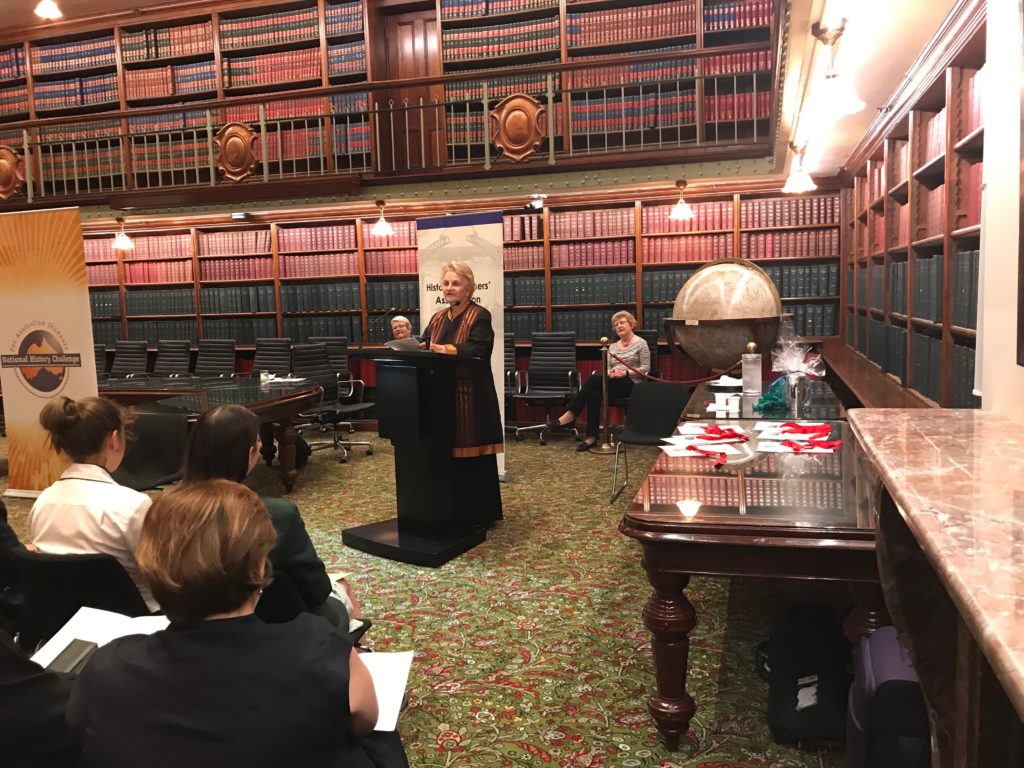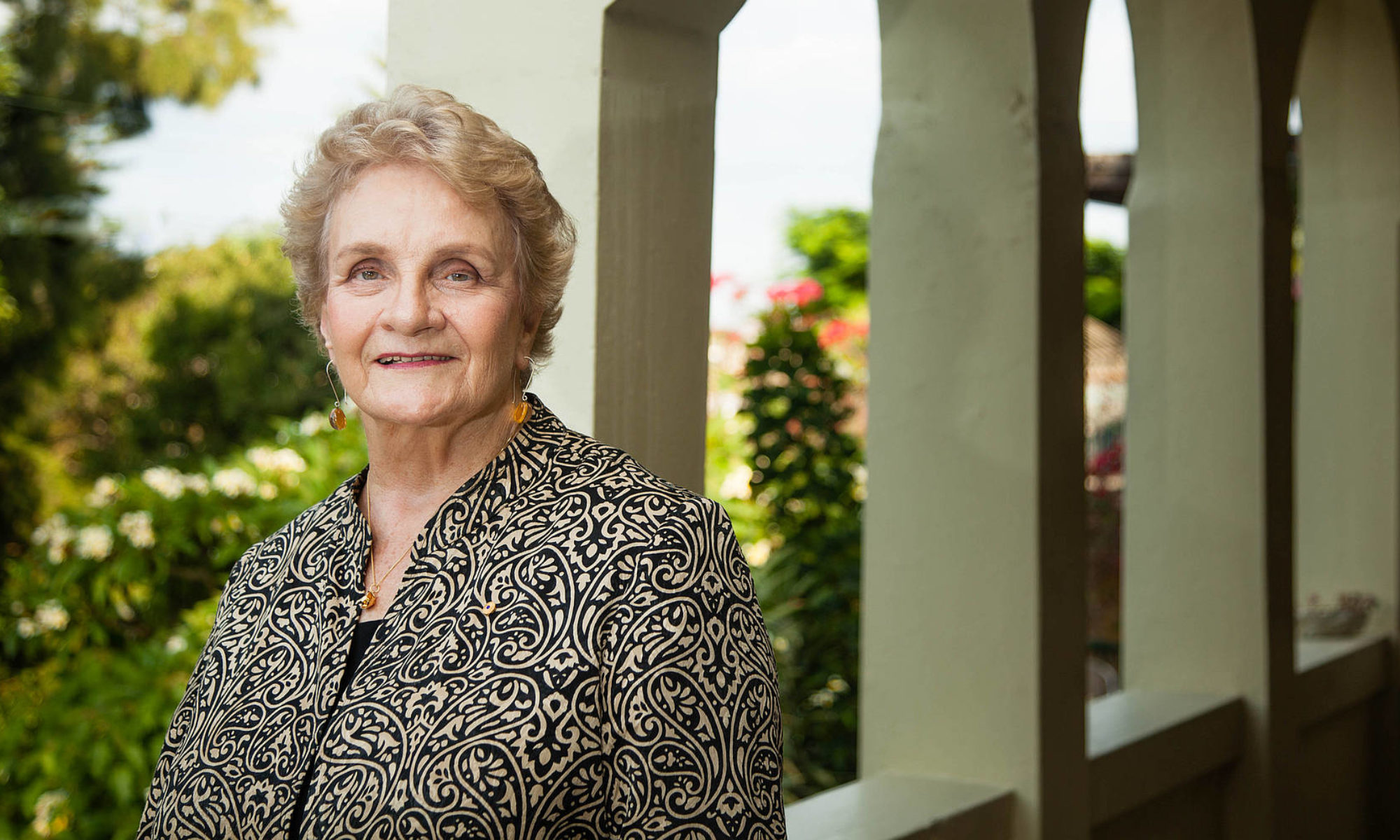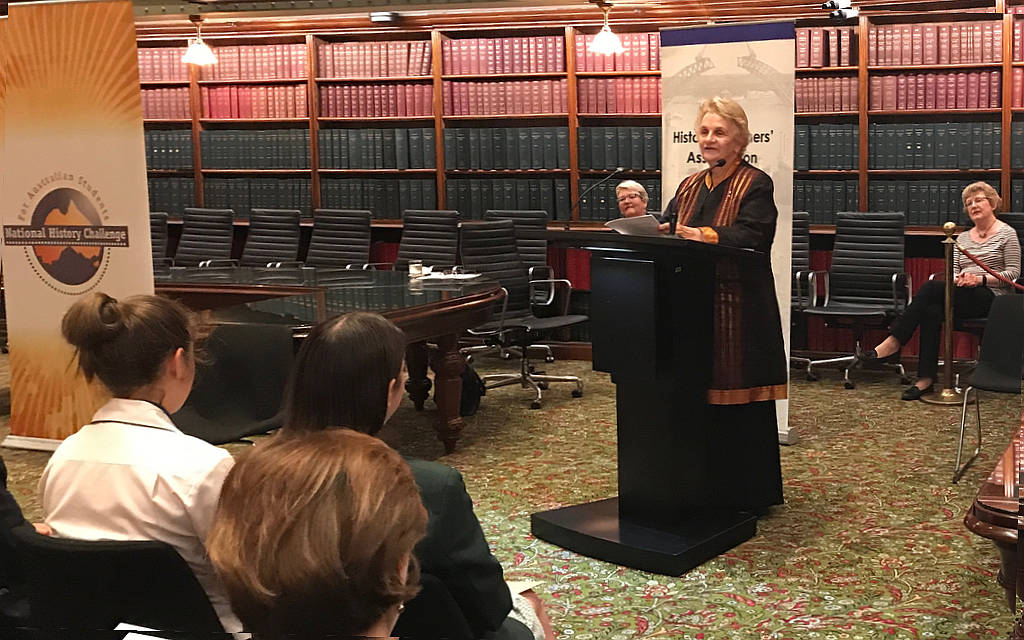National History Challenge NSW State Presentation 2017
The Jubilee Room, Parliament House of New South Wales
Thursday 19 October 2017

Making a Better World?
Professor Shirley Randell AO, PhD
National Foundation of Australian Women
I wish to add my acknowledgement that we are on Aboriginal land, thank you for your welcome to Country, and also pay my respect to Elders past and present.
Thank you to the sponsors and judges, and congratulations to the winners of these wonderful awards of the New South Wales Section of the 2017 National History Challenge. And special acknowledgements to the five young people here whose entries have also won national awards in their categories.
I am now 77. I have four adult children with their four partners, 14 grandchildren and a great grandchild, who I continually encourage to be global citizens and to contribute to making the world a better place. Today I would like to share with you some of what I have learned in 20 years of working with the governments and the people of Australia, the Pacific, Asia and Africa.
I would like to say a few words about making the world a better place, a world where human issues of gender inequality lie at the very crux of the global problems everyone suffers, from poverty to the age crisis, the rise in violent fundamentalism, human trafficking and human rights abuses. And we all have the opportunity, and indeed the obligation, to speed progress in those issues.
Today, the idea of ‘global citizenship,’ of humans growing and learning and acting and working, with consideration of both the history of our world and our place in the global community has become fundamental. Being globally connected, emerging as global citizens, will support women as well as men to show leadership and achieve equality. Each one of us needs to be globally connected. While bringing our distinct cultural knowledge and values to the table, the days of staying in our cultural and national boundaries are gone. Global citizenship obliges an ability and capacity to think as part of one broad humanity, and is essential for our survival.
It is in believing in the ‘oneness’ of humanity, that we are all connected and interconnected, all interdependent. Humanity cannot make progress without all of us feeling that way. Whatever we do in our own community has an impact – positive or negative – on the rest of the world. Nothing and no one can feel independent of connection with the world. Interconnected global challenges call for far-reaching changes in how we think and act for the dignity of fellow human beings, bringing shared values to life and actively caring for the world.
The study of history prepares us well for the six major global challenges that I believe require advanced global citizenship to find solutions: universal education, economic development, climate change, peace and security, global immigration, and eliminating violence against women and girls. Our historical studies have taught us to think critically and creatively, and the value of a good enquiry-based education is in learning from our shared and distinct histories, utilising our expanding knowledge and in our willingness to contribute and take part in the wider world. Global citizenship is a basic cornerstone for
effective leadership moving toward a sustainable international future.
The world is now our workplace as well as our home, and people from across the globe are now our partners. As ever, our family, neighbors and close community always remain critical, but our field of influence is the globe.
So I would like to leave you with a few questions.
How will you use your gifts? What choices will you make?
Will ‘ordinary’ be your guide, or will you follow your passions?
Will you follow dogma, or will you be original?
Will you choose a life of ease, or a life of service and adventure?
Will you wilt under criticism, or will you follow your convictions?
Will you bluff it out when you are wrong, or will you apologize?
Will you play it safe, or will you be courageous?
When it is tough, will you give up, or will you be resilient?
Will you be a cynic, or will you be a builder?
Will you be clever at the expense of others, or will you be kind?
Will you dare to take up a major global issue as a global citizen and passionately pursue it?
There is nothing naïve about our impulse to make a better world. Because all it takes is one act of service — one blow against injustice — to start a tiny ripple of hope. Our choices, words and actions can make a difference.
Malala Yousafzai, a young girl from Pakistan, has done more to raise the consciousness around the globe about the importance of education for girls in her country and indeed the world, than any government campaign or a thousand international aid awareness programs could do. Her words “One child, one teacher, one book and one pen can change the world” are now immortal.
Don’t be afraid to speak up and speak out and use the critical analysis skills you have learned in this wonderful competition, to think independently and wisely. It is your ability that will hold you in good stead.
Just one word, one act – that is what makes a better world for all of us.
Download NFAW history awards 2017 PDF


Shirley, this is a master piece.
We never know when one word or action from us will impact on others and unwittingly, change lives for the better, in this world.
My theory is… if you are not part of the solution, you are part of the problem.
My parents took in ‘waifs and strays’, long before I was born and for many years afterwards. I grew up thinking that every family did this. I soon found that was not the case.
I have volunteered and given out to those who are less fortunate than me, all my life. It has come back to me ten fold.
I so enjoy your newsletters and send them off to friends around the world.
May the years ahead treat you kindly.
With blessings
Noni Gove